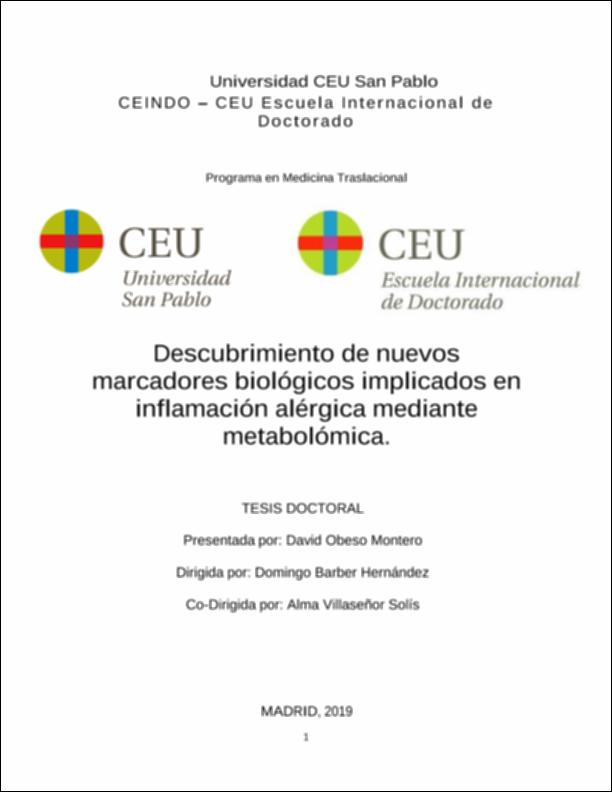Please use this identifier to cite or link to this item:
http://hdl.handle.net/10637/12821Descubrimiento de nuevos marcadores biológicos implicado en inflamación alérgica mediante metabolómica.
| Title: | Descubrimiento de nuevos marcadores biológicos implicado en inflamación alérgica mediante metabolómica. |
| Authors : | Obeso Montero, David |
| Keywords: | Alergia alimentaria.; Metabolómica.; Plaquetas.; Alergia respiratoria.; LC-MS.; GC-MS.; Food allergy.; Metabolomics.; Platelets. |
| Abstract: | Antecedentes: La prevalencia y la gravedad de las enfermedades alérgicas está aumentado en todo el mundo. Hasta la fecha, los fenotipos de la alergia respiratoria no están totalmente caracterizados y, junto con la progresión de la inflamación, el tratamiento es cada vez más complejo y costoso. La sensibilización a la profilina constituye un buen modelo para estudiar la progresión de la inflamación alérgica. El objetivo fue identificar los mecanismos subyacentes y biomarcadores asociados a esta progresión, centrándonos en los fenotipos graves, utilizando la metabolómica.
Métodos: Se incluyeron 25 individuos en el estudio. Las muestras de plasma se analizaron mediante cromatografía de gases y líquidos acoplada a espectrometría de masas y se clasificaron en cuatro grupos: "no alérgicos", "leves", "moderados" y "graves".
Resultados: Encontramos un conjunto de metabolitos específicos del fenotipo "grave". Disminución de carbohidratos y piruvato, y un aumento de lactato, sugiriendo una glucólisis aeróbica. Otros metabolitos aumentados en “graves” fueron: lisofosfolípidos, esfingosina-1-fosfato, y diferentes ácidos grasos. Las carnitinas disminuyeron con la gravedad.
Conclusión: Se han encontrado evidencias que apuntan a la asociación de la inflamación alérgica grave con la alteración de las funciones plaquetarias, junto con la reducción de la síntesis de proteínas, y el cambio de las células inmunes a glucólisis aeróbica. Background: Prevalence and severity of allergic diseases have increased worldwide. To date, respiratory allergy phenotypes are not fully characterized and, along with inflammation progression, treatment is increasingly complex and expensive. Profilin sensitization constitutes a good model to study the progression of allergic inflammation. Our aim was to identify the underlying mechanisms and the associated biomarkers of this progression, focusing on severe phenotypes, using transcriptomics and metabolomics. Methods: Twenty‐five subjects were included in the study. Plasma samples were analyzed sing gas and liquid chromatography coupled to mass spectrometry (GCMS and LC‐MS, respectively).Individuals were classified in four groups — “non-allergic,” “mild,” “moderate,” and “severe” — based on their clinical history, their response to an oral challenge test with profilin, and after a refinement using a mathematical metabolomic model. PBMCs were used for micro array analysis. Results: We found a set of transcripts and metabolites that were specific for the “severe” phenotype. By metabolomics, a decrease in carbohydrates and pyruvate and an increase in lactate were detected, suggesting aerobic glycolysis. Other metabolites were incremented synthesis, and switch of immune cells to aerobic glycolysis. In “severe” group: lysophospholipids, sphingosine‐1‐phosphate, sphinganine‐1‐phosphate, and lauric, myristic, palmitic, and oleic fatty acids. On the other hand, carnitines were decreased along severity. Significant transcripts in the “severe” group were found to be downregulated and were associated with platelet functions, protein synthesis, histone modification, and fatty acid metabolism. Conclusion: We have found evidence that points to the association of severe allergic inflammation with platelet functions alteration, together with reduced protein synthesis, and switch of immune cells to aerobic glycolysis. |
| Description: | Tesis-CEINDO, Universidad San Pablo CEU, Programa en Medicina Traslacional, leida el 21 de enero 2020 |
| Director(s): | Barber Hernández, Domingo |
| URI: | http://hdl.handle.net/10637/12821 |
| Rights : | http://creativecommons.org/licenses/by-nc-nd/4.0/deed.es |
| Issue Date: | 25-Jun-2021 |
| Center : | Universidad San Pablo-CEU |
| Appears in Collections: | Medicina Traslacional |
Items in DSpace are protected by copyright, with all rights reserved, unless otherwise indicated.


